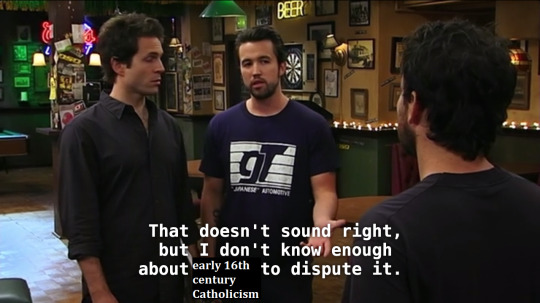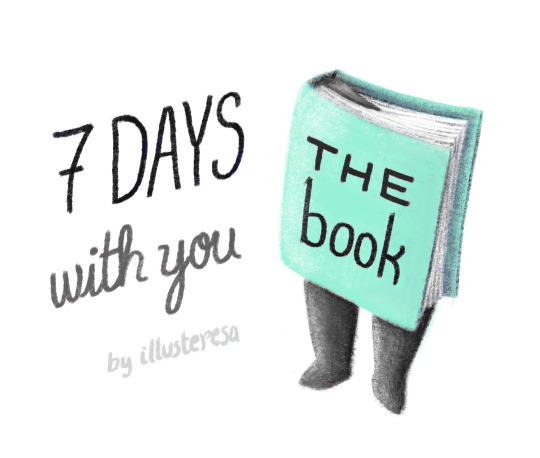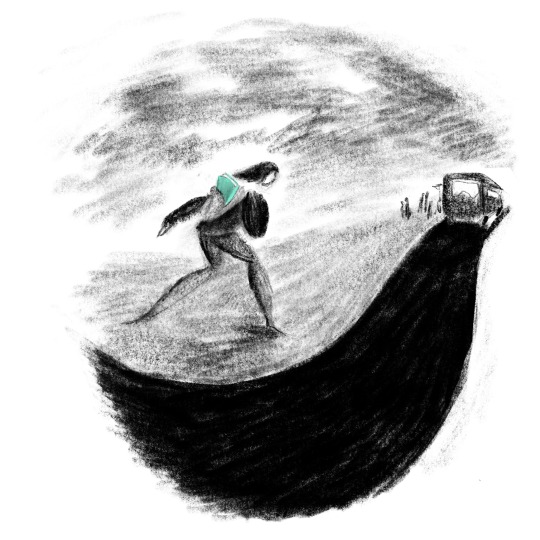#If I have to see one more person whose speciality is writing sensational paperbacks about Henry VIII's court
Text
Alright uninformed rant time. It kind of bugs me that, when studying the Middle Ages, specifically in western Europe, it doesn’t seem to be a pre-requisite that you have to take some kind of “Basics of Mediaeval Catholic Doctrine in Everyday Practise” class.
Obviously you can’t cover everything- we don’t necessarily need to understand the ins and outs of obscure theological arguments (just as your average mediaeval churchgoer probably didn’t need to), or the inner workings of the Great Schism(s), nor how apparently simple theological disputes could be influenced by political and social factors, and of course the Official Line From The Vatican has changed over the centuries (which is why I’ve seen even modern Catholics getting mixed up about something that happened eight centuries ago). And naturally there are going to be misconceptions no matter how much you try to clarify things for people, and regional/class/temporal variations on how people’s actual everyday beliefs were influenced by the church’s rules.
But it would help if historians studying the Middle Ages, especially western Christendom, were all given a broadly similar training in a) what the official doctrine was at various points on certain important issues and b) how this might translate to what the average layman believed. Because it feels like you’re supposed to pick that up as you go along and even where there are books on the subject they’re not always entirely reliable either (for example, people citing books about how things worked specifically in England to apply to the whole of Europe) and you can’t ask a book a question if you’re confused about any particular point.
I mean I don’t expect to be spoonfed but somehow I don’t think that I’m supposed to accumulate a half-assed religious education from, say, a 15th century nobleman who was probably more interested in translating chivalric romances and rebelling against the Crown than religion; an angry 16th century Protestant; a 12th century nun from some forgotten valley in the Alps; some footnotes spread out over half a dozen modern political histories of Scotland; and an episode of ‘In Our Time’ from 2009.
But equally if you’re not a specialist in church history or theology, I’m not sure that it’s necessary to probe the murky depths of every minor theological point ever, and once you’ve started where does it end?
Anyway this entirely uninformed rant brought to you by my encounter with a sixteenth century bishop who was supposedly writing a completely orthodox book to re-evangelise his flock and tempt them away from Protestantism, but who described the baptismal rite in a way that sounds decidedly sketchy, if not heretical. And rather than being able to engage with the text properly and get what I needed from it, I was instead left sitting there like:

And frankly I didn’t have the time to go down the rabbit hole that would inevitably open up if I tried to find out
#This is a problem which is magnified in Britain I think as we also have to deal with the Hangover from Protestantism#As seen even in some folk who were raised Catholic but still imbibed certain ideas about the Middle Ages from culturally Protestant schools#And it isn't helped when we're hit with all these popular history tv documentaries#If I have to see one more person whose speciality is writing sensational paperbacks about Henry VIII's court#Being asked to explain for the British public What The Pope Thought I shall scream#Which is not even getting into some of England's super special common law get out clauses#Though having recently listened to some stuff in French I'm beginning to think misconceptions are not limited to Great Britain#Anyway I did take some realy interesting classes at uni on things like marriage and religious orders and so on#But it was definitely patchy and I definitely do not have a good handle on how it all basically hung together#As evidenced by the fact that I've probably made a tonne of mistakes in this post#Books aren't entirely helpful though because you can't ask them questions and sometimes the author is just plain wrong#I mean I will take book recommendations but they are not entirely helpful; and we also haven't all read the same stuff#So one person's idea of what the basics of being baptised involved are going to radically differ from another's based on what they read#Which if you are primarily a political historian interested in the Hundred Years' War doesn't seem important eonugh to quibble over#But it would help if everyone was given some kind of similar introductory training and then they could probe further if needed/wanted#So that one historian's elementary mistake about baptism doesn't affect generations of specialists in the Hundred Years' War#Because they have enough basic knowledge to know that they can just discount that tiny irrelevant bit#This is why seminars are important folks you get to ASK QUESTIONS AND FIGURE OUT BITS YOU DON'T UNDERSTAND#And as I say there is a bit of a habit in this country of producing books about say religion in mediaeval England#And then you're expected to work out for yourself which bits you can extrapolate and assume were true outwith England#Or France or Scotland or wherever it may be though the English and the French are particularly bad for assuming#that whatever was true for them was obviously true for everyone else so why should they specify that they're only talking about France#Alright rant over#Beginning to come to the conclusion that nobody knows how Christianity works but would like certain historians to stop pretending they do#Edit: I sort of made up the examples of the historical people who gave me my religious education above#But I'm now enamoured with the idea of who actually did give me my weird ideas about mediaeval Catholicism#Who were my historical godparents so to speak#Do I have an idea of mediaeval religion that was jointly shaped by some professor from the 1970s and a 6th century saint?#Does Cardinal Campeggio know he's responsible for some much later human being's catechism?#Fake examples again but I'm going to be thinking about that today
128 notes
·
View notes
Text
The Book I’ll Never See Again
Passive Adventures of a Book and its Reader
A few weeks ago I borrowed a book from the LRC about a subject that we had to research for a module. I spent a long time with this fine book, he had so much knowledge inside his pages and I even felt anxious while working with him due to the short period of time I had for this assignment.
I lived a whole journey with this book. I took him to the laundry with me to be studied, I roamed around campus trying to find people with him under my arm, I ran after the bus carrying its weight on my back, I slept with him laying on my desk.
I know how weird this might seem but I started to work with this book that isn’t mine and then I needed to return him to the library and for the first time I had the sensation of loss towards an object of no value to me. This feeling probably only appeared now because I never had such a good library at my disposal back in Portugal. Seeing him being taken away for shelving with the unknown crowd of books I know nothing about, he disappears so quickly that he leaves a hole inside my chest knowing how hard it would be to find him again. I guess when I close myself to study and end up studying day and night non-stop I create a relationship with the studied object, some sort of attachment to it (Kwok, Grisham & Norberg, 2018) and he became a memento of feelings, a ride through knowledge, a week’s companion.
Of course the feeling didn’t last much but still, to my surprise, it happened. I get easily attached to things I own or make but never to things that don’t belong to me. It was evident to me that book’s subject had no connection whatsoever to why I got such feeling. This was a feeling I had to research about: it was seriously worrying to me the fact that I missed a book that wasn’t even that impressive in his content. It´s like I was a lover to someone who never saw me as anything other than that since books have no feelings. I felt a piece of my journey was being taken away. And it was. And now this book is back in the shelf where it all started and it will take probably a year until someone picks him up again.
The Power of a Book
I knew that if I started to research about the pure relationship between someone and an object I would find loads of fiction and non-fiction regarding hoarding, mementos, souvenirs, memory boxes and more so I decided to stick to the book theme for now.
There are some great romances about the importance of books to one’s memories and how relationships bloom from them like Markus Zusak’s dramatic novel “The Book Thief”. Other publication’s rely on the books content and how life changing such information was for them like the historical fiction “People of the Book” by Geraldine Brooks, “Reading Lolita in Tehran” by Azar Nafisi, “Fahrenheit 451” written by Ray Bradbury or Molly Guptill Manning’s non-fiction book “When Books Went to War” whose idea was sparked by an event in May 1933 Germany where books were burnt in a huge bonfire in the middle of the street (Ritchie, 1988) just like Geraldine Brooks and Ray Bradbury’s books. This triggers me in such a way but I am not going to focus on how outrageous this act was even though it was a symbolic act by university’s graduates. Still, one should never burn a book, ever. Give it away if you must, but never throw it out like that (I could go on and on about the book bonfire of 1933 but I’ll leave it for another post).
A title I found with some similarities to what I felt was “The man who loved books too much” by Allison Hoover Bartlett which talks about a thief that steals books due to loving them so deeply. Of course his feelings towards these books come from its content which does not relate to what I felt.
In juvenile literature I found one book about a similar subject which is “O Caderno Vermelho da Rapariga Karateca” (the karateka’s red notebook) by Ana Pessoa which shows the main character’s relationship with her notebook where she writes and rambles about her life, makes up stories and questions the world and other philosophical subjects while interacting with it. But still it has no resemblance to what I felt: There is an end to it but she doesn’t feel loss since the notebook is hers. Another Juvenile publication I found compelling is one where the book is the narrator of its history since the invention of the alphabet till nowadays’ ebooks simply named “Book” by John Agard. Both of these have graphics that will amaze any reader despite his or her age. The Illustrations are splendid.
Caldecott honor book “The Red Book” by Barbara Lehman also revolves around a book but what resides inside of the book is what hooks the reader through the sequential narrative. This red book brings people together and is lost and passed to other people’s hands constantly - if the story where to keep going, a lot of people would meet due to stumbling upon the red object. Though the story’s primary focus is a book, it is only a portal to another place on earth, to another person. Since it is a postmodern wordless picturebook, this is my personal interpretation but it can vary immensely.
A book with some similarities in the sensation of possession is a fantasy called “Inkheart” where there is a magical book who trapped the protagonist’s mother inside when she was young. In this book the attachment is visible but is due to having someone imprisoned inside, not due to the object in itself which is the craved subject of every character for the powers he holds.
One intriguing book I found with a much similar subject to my little adventure was “Too Loud a Solitude” by Bohumil Hrabal where the main character’s simple way of living among books and his immense knowledge is portrayed. This one relates to what I felt since the only company the narrator has is its books which he has connected with until he loses his job along with the access to more knowledge.
In terms of art with books I found this beautiful project called “The Book” where the author Julius Friedman, a designer, made series of collages and photos from old books that were given to him by a librarian. Funny enough it was not the book’s amazing imagery that I found compelling but how he was bugged by them being in his desk alone waiting for him to do something with them and how he ended up doing so. How the fact of the book pile existence made him change from not being able to cut books up to making them into art pieces shows the power the book has as an object and not only as a source of information.
None of these books about books portray the book as the main focus in their plot. They do not show the feeling I had. The more research i made on the subject the more I was convinced: there is a lack of literacy portraying this subject, specially to children who I feel need it mostly. So what if I filled this literary gap? Children often get attached to their toys but what about being attached to a book? The value of the book as an object itself is not a subject that has been approached yet in children literature and I sincerely believe that, if it was, it could change the way kids look at a book by showing its value throw a postmodern way.
Now I look back after researching and I feel amazed with my findings so I decided to sketch a little story (see images below). My effort for the module’s assignment hopefully paid off, I had an idea for an exploratory illustration series about the romance between a book and her reader and I gained culture and learnt a bit more about myself and literary history.



References:
Agard, J. (2014) Book: “My Name is Book and I’ll Tell You The Story of My Life...”. London: Walter Books.
Bradbury, R. (1953) Fahreheit 451. New York: Ballantine Books.
Brooks, G. (2008) People of the Book. Danvers: Penguin Books.
Friedman, J. (2016) The Book, Louisville: Old Stone Press.
Funke, C. (2003) Inkheart. Somerset: Chicken House.
Guptill Manning, M. (2014) When Books Went to War: The Stories that Helped Us Win World War II. Boston: Houghton Mifflin Harcourt.
Hoover Bartlett, A. (2009) The Man Who Loved Books Too Much: The True Story of a Thief, a Detective, and a World of Literary Obsession. New York: Riverhead Books.
Hrabal, B. (2007) Too loud a Solitude. London: Abacus
Kwok, C., Grisham, J.R. & Norberg, M.M. (2018) “Object attachment: Humanness increases sentimental and instrumental values.” Journal of behavioral addictions. [Online] 7 (4). Available from: https://akademiai.com/doi/full/10.1556/2006.7.2018.98 [Accessed 26th October 2019].
Lehman, B. (2004) The Red Book, Boston: Houghton Mifflin.
Nafisi, A. (2003) Reading Lolita in Tehran. New York: Random House Trade Paperbacks.
Pessoa, A. (2012) O Caderno Vermelho da Rapariga Karateka. Lisbon: Planeta Tangerina.
Ritchie, J. M. (1988) “The Nazi Book-Burning.” The Modern Language Review. [Online] 83 (3). Available from: https://www.jstor.org/stable/pdf/3731288.pdf [Accessed 25th October 2019].
Zusak, M. (2006) The Book Thief. New York: Alfred A. Knopf.
0 notes